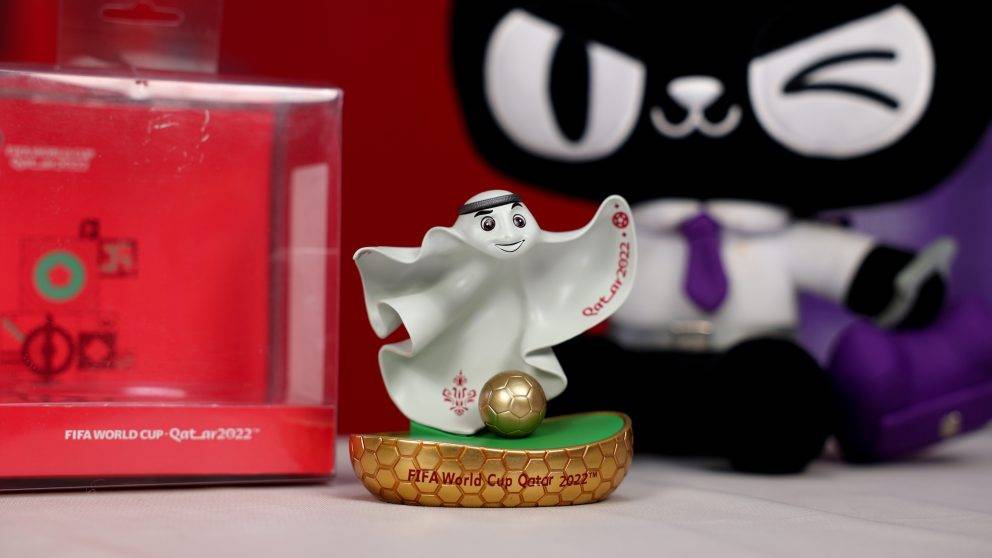


Mulberry sees a positive recovery in Asia Pacific. Photo credit: Mulberry
This week, British luxury brand Mulberry said its China retail sales grew 6% year-over-year with help from consumer-facing digital marketplace Tmall.
The cloud computing arm of Alibaba Group shared how it is powering the carbon emission-cutting abilities of World Cup 2022 mascot La’eeb.
In other news, many soccer fans in China are watching the World Cup matches over steaming hotpots and chilled beers, according to data from B2C marketplace Tmall. Tasty!
Mulberry China Sales Jump Despite Pandemic Restrictions
The British luxury brand said on Thursday it had grown its China retail sales 6% in the half year ending Oct. 1 compared with the same period a year earlier, which contributed to a 1% increase in Asia Pacific retail sales to £11.9 million ($14.6 million).
In Asia Pacific, digital sales grew by 23% year-over-year to £2.7 million, supported by local fullfilment in Japan and the development of strategic partnerships, including with Tmall in China.
Digital sales represented a quarter of the group’s revenue. In Asia Pacific, digital sales grew to 23% of the region’s sales, supported by developing strategic partnerships, including Tmall and Naver in Korea.
Mulberry said it saw a positive recovery in Asia Pacific, despite a number of pandemic-related restrictions still applying early in the period, with overall sales marginally up on the same period last year. The brand opened stores in the region at Nanjing Deji, China, in April, and a pop-up in Gwang Ju, Korea, in May.
Since the period ended, it opened a store at the Battersea Power Station in London on Oct. 14 and launched a duty-free store in Hainan, Greater China.
World Cup 2022 Mascot La’eeb Taps Alibaba Cloud to Cut Carbon Emissions
The World Cup 2022 mascot, La’eeb, uses Alibaba Cloud’s AI-powered sustainability platform Energy Expert to reach carbon neutrality, the cloud computing company revealed this week.
The manufacturer of La’eeb in China used the platform to measure and analyze carbon emissions and found that one 9-cm high La’eeb mascot has a cradle-to-gate carbon footprint of 2.85 kg of carbon dioxide emissions.
The AI-powered platform also helped the manufacturer to reconfigure its operations. Through recycling its production waste, the manufacturer of La’eeb in China found it could slash carbon emissions by 206.1 g per mascot.
La’eeb has earned its carbon neutrality certification from PAS 2060, a carbon neutrality standard by the British Standards Institution.



Alibaba’s AI model Scores Higher than Humans in Chinese Comprehension
Alibaba’s research institute DAMO Academy has designed an AI model able to outperform humans in deciphering and understanding the Chinese language, according to the Chinese Language Understanding Evaluation (CLUE) benchmark.
It marks the first time AI models have scored higher than humans on the benchmark since it was established three years ago.
The industry-wide recognized benchmark tests the AI model’s natural language processing capabilities based on performances in nine tasks, including reading comprehension and natural language deduction.
DAMO Academy said it has used the AI Model, dubbed Alice Mind, to support functions such as machine translation, document processing and engaging with inquiries.
Its machine translation system has helped over two million small and medium-sized merchants on Alibaba’s cross-border e-commerce platform translating over 200 languages.
Hotpot & Wine for World Cup Fans in China
Hotpot soup base sales rose 100 times higher than crayfish products on Alibaba’s online grocery store Tmall Supermarket between Nov. 20 and Nov. 26, as Chinese soccer fans tucked into the hearty winter dish.
What goes into the hotpot? Meat, for one. Sales of beef shank, meatballs, lamb ribs, and legs rose by over 100%, while the growth of lamb chops was over 300%.
“We predicted that pre-made crawfish, instant food and snacks may have better growth, but it seems people are more enthusiastic about hotpot while watching the game,” Qiu Yang, who leads Tmall Supermarket’s food category, said in Mandarin.
Consumers are cheering on their favorite teams with alcoholic tipples in hand. Beer sales on the platform rose 70%, and wine and liquor purchases more than doubled from the same period last year.
Alibaba Cloud Signs Partnership in Hong Kong to Support Web3.0 developers
Alibaba’s cloud computing arm said it would build an infrastructure and tech platform for Web3.0 developers with local partners in Hong Kong.
Alibaba Cloud signed a memorandum of understanding on Tuesday with Hong Kong-based HashKey Group, an end-to-end digital asset company, and PlatOn, a decentralized privacy-preserving computation network.
The trio will create a platform that provides back-end tech infrastructure and ready-to-use tools to free developers from maintenance tasks and focus on building Web 3.0 applications in the metaverse, gaming and social media.
They will also work together to build a Web3.0 ecosystem, including launching a regional Web3.0 Hackathon, hosting meetups, and offering online courses on Web3.0.
Alibaba Sees Green Shoots of Recovery In China Discretionary Consumer Spending
Alibaba’s Robert Lin told investors on Wednesday that the company had spotted signs of recovery in Chinese consumers’ discretionary spending.
“We’re seeing signs of recovery,” Lin, Alibaba Group, Head of Investor Relations and Member of the company’s Sustainability Steering Committee, told an investment conference.
During the 11.11 campaign, “we saw a decent recovery in the discretionary category: apparel, consumer electronics are starting to improve,” he told the audience of KraneShares’ Annual Investor Conference.
Alibaba’s Taobao and Tmall continued to attract and retain a cohort of big spenders. For the twelve months ending Sept. 30, 124 million consumers each spent over RMB10,000 on the two digital marketplaces.
Read the full story here
Alibaba Pictures Reports 35% Revenue Growth Driven by Content Investment
Alibaba’s digital entertainment arm Alibaba Pictures reported a 35% year-over-year jump in revenue for the six months ending Sept. 30, due to the company’s investment in content.
Alibaba Pictures’ revenue climbed to RMB1.83 billion ($256.11 million) in the six months ending Sept. 30, a Hong Kong stock exchange filing showed on Tuesday. Its adjusted EBITA turned positive and reached about RMB149 million from a loss of RMB5 million in the same period last year.
“The group focuses on creating high-quality content for the entertainment industry and increases its presence in the pan-entertainment industry through enhancing its dual engine technology-and-content strategy,” Alibaba Pictures CEO and Chairman Fan Luyuan said in the release.
Get the full story here
Global Brands Stream Black Friday Sales on Taobao Live
International brands celebrated the shopping bonanza Black Friday with an influx of livestreams on Taobao Live.
New York’s Woodbury Common outlet mall took the opportunity on Black Friday to livestream exclusive sales for the second time in as many months.
They were one of 20,000 global brands who used the platform’s livestreaming tools to reach Chinese consumers on one of America’s largest shopping events taking place at the beginning of the Thanksgiving long weekend.
Read more here
Alibaba Health’s Shares Leap On Turning Profitable
Shares of Alibaba’s Hong Kong-listed digital healthcare platform Alibaba Health Information Technology jumped 9.7% after the company moved into the black for the first time.
For the six months ending Sept. 30 the company recorded RMB162 million ($22.61 million) in net profits, compared with a loss of RMB231.6 million for the same period last year, while revenue increased by 22.9% year-over-year to RMB11.5 billion.
“Alibaba Health’s pharmaceutical e-commerce platform possesses the most comprehensive product catalog in terms of SKUs [stock keeping units] sold through the safest and the most reliable process,” it said in the earnings report filed with the Hong Kong stock exchange operator on Monday after the close of trading.
Get the full story here





